INCREASING OUR IMPACT ON EACH OTHER: CHECK ON YOUR STRONG FRIENDS AND CHECK ON YOU
JUDGE
I DON’T KNOW ABOUT YOU, but the last several years have been challenging for me personally and professionally, yet every day I’ve had to get up and do the work whether I felt up to it or not. I know I’m not alone, and neither are you. From recent events, it’s clear that so many of our colleagues feel alone and have taken drastic and permanent steps to try and erase their pain. This is heartbreaking and has us asking ourselves questions like: “How did I miss the signs? What could I have done differently? How could I have supported them more?”
Please do not bear the burden for someone else’s actions, but in a profession that can be so adversarial, it’s important to remember that civility is the most important form of courtesy we can practice. Most, if not all, of us suffer from anxiety and situational depression. Life’s circumstances ebb and flow, but when we have the capacity for ourselves and others, there’s always the ability to “check on our strong friends.” So what does checking on our strong friends mean? A few simple examples could be:
• If you haven’t seen someone at a luncheon or event that you know they frequent, give them a call.
• Go through your phone contacts in alphabetical order and send a text asking how they are doing.
• Invite a colleague that you typically see eating alone out to lunch.
Recently, the WCBA Bar Leadership began our strategic planning process for 2023-2026. Very early on it became clear from our most recent survey that our membership valued diversity and inclusion efforts and wellness. With our profession having one of the highest substance abuse and suicide rates due to the stress, it’s key that we prioritize our mental, physical, emotional and spiritual health. While we talk about there being a “work/life balance,” the reality is that there typically isn’t a balance. We just juggle whichever one is most prevalent in that moment.
The ironic part is that because of the type of work we do, we’re typically seen as the strong friend, the one that everyone turns to when they have a problem or concern due to our problem-solving abilities. So how do we “check in on ourselves” when we feel like no one else is. A few tips that I’ve found helpful to prioritize my health is to:
• Seek therapy. (Check out my prior article about therapy titled: “Res Ispa Loquitur: We all need Therapy”)
• Get 8-10 hours of sleep. When my kids go to sleep, I do too.
• Exercise regularly and try to eat healthily.
• Practice gratitude and focus on positivity with daily affirmations.
• Staying connected to positive people who offer encouragement.
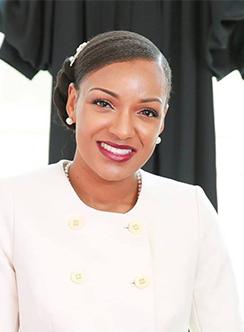
• Take time to self-reflect on your own emotions and needs.
• Intentionally unplugging and taking social media breaks.
Remember: We can’t assume that someone is okay, just because they appear to be. On that same token, you can’t assume that you’re okay, just because you’re functioning. Let’s stop normalizing surviving and begin to emphasize thriving!
If you or someone you know is in crisis, call or text 988 for Lifeline Chat (formerly the National Suicide Prevention Lifeline) or dial 911 in case of emergency. Additionally, your membership not only affords you three free counseling sessions through BarCares, but they also have a 24/7 crisis line at 1-800-640-0735. WBF


UPCOMING EVENTS
WCBA
June 8 | 9:30 a.m. - 4:45 p.m. | Raleigh, NC

June 8 | 5 - 7 p.m. | Raleigh, NC
YLD
INSIDE THIS ISSUE
VIRTUAL LUNCHEON WITH KKJ FORENSIC AND PSYCHOLOGICAL SERVICES June 6 | 12:45 p.m. | Online
SUMMER CLERK ORIENTATION 2023
YLD AND SUMMER CLERKS SOCIAL
FOOD BANK VOLUNTEER DAY
June 10 | 9 a.m. - Noon | Raleigh, NC
NOTE
THE POCKET June
Raleigh, NC AM Shift: 9 a.m.
12 p.m. | PM Shift: 1
4 p.m.
WCBA DAY OF SERVICE AT
IN
16 |
-
-
A NOTE FROM THE EXECUTIVE DIRECTOR 3 A CALL FOR PROFESSIONALISM 4 DIVERSITY, EQUITY & INCLUSION COMMITTEE UPDATE 5 SUMMER WITH THE PUBLIC SERVICE COMMITTEE 5 WCBA FOUNDATION 6 WCBA FOUNDATION DONORS 7 DIRECT EXAMINATION 9 OVERCOMING PANDEMIC BRAIN FOG 11 NC STATE BAR DEPUTY COUNSEL 12 SWEARING-IN CEREMONIES 13 WELCOME NEW MEMBERS
FLYER SUICIDE AND THE LEGAL PROFESSION Breaking the silence around suicide and mental health with Ed Ergenzinger ...........................................14 VOL. LXIII • ISSUE 2 | SECOND QUARTER 2023 Visit our website: www.wakecountybar.org 919.677.9903 phone
2
BAR
ASHLEIGH PARKER DUNSTON, WCBA & TENTH
JUDICIAL DISTRICT BAR PRESIDENT
WAKE BAR FLYER
VOL. LXIII | No. 2 | SECOND QUARTER 2023
President
JUDGE ASHLEIGH P. DUNSTON, WCBA & TENTH J.D. BAR
President-elect
SARAH PRIVETTE, WCBA
President-elect
JAMES HASH, TENTH J.D. BAR
Secretary
MEREDITH PACE BREWER
Treasurer
ELYSIA PRENDERGAST-JONES
Immediate Past Presidents
YVONNE ARMENDARIZ, WCBA
DAYATRA T. MATTHEWS, TENTH J.D. BAR
Board of Directors
KRISTEN L. BEIGHTOL
DAVID R. BOAZ
TIFFANY G. COX
JAKE EPSTEIN
JUDGE SAM HAMADANI
LEANOR B. HODGE
JOHN HOOMANI
ERIKA N. JONES
JENNIFER M. JONES
DEAN J. RICH LEONARD (EX OFFICIO)
KELLIE MYERS
WILL OWENS
STEPHANIE N. ROBINSON
KENDRA STARK
PATRICK WILLIAMS
Young Lawyers Division President
JACOB M. MORSE
Young Lawyers Division President-elect
CARLY G. BAKER
Executive Director
WHITNEY D.G. VON HAAM
Wake Bar Flyer Editor
CANDACE B. MARSHALL
Communications
AMY DAVIS
Wake Bar Flyer Designer
ANNE R. STRICKLAND
Tenth Judicial District Bar Councilors
JULIE L. BELL
HEIDI C. BLOOM
WALTER E. BROCK
ASHLEY H. CAMPBELL
KATHERINE A. FRYE
KIMBERLY A. MOORE
JUDGE ROBERT B. RADER
WARREN T. SAVAGE ©
REAPING THE REWARDS OF COLLEGIALITY
WHITNEY D.G. VON HAAM, WAKE COUNTY BAR ASSOCIATION

WE HAVE BEEN SO FORTUNATE this spring: we’ve actually had a chance to enjoy the cool mornings and warm afternoons of a true spring. For those who are gardeners, I’ve appreciated the gorgeous irises and daffodils with envy…Alas, though I try, I am just not one who has been gifted with the thumb of green.
Like the abundant buds of spring, collegiality is not something that simply appears. It has to be planted, watered and cared for with the end result something potentially beautiful. As a WCBA member, I hope you have been able to cultivate all the benefits that our high level of collegiality can provide, whether it is increased business contacts, continued relationships, greater happiness and fulfillment or lower stress. But, you can’t come to one in-person event per year and expect those benefits to flourish.
For those who know me, this is going to come as a complete shock: I am an extrovert, like, an EXTREME extrovert, which in an association atmosphere is the same as a green thumb for a gardener. Therefore, I know that everyone is not as comfortable around crowds, particularly those filled with colleagues, judges or unknown faces. At the beginning of May, we enjoyed perfect spring weather for our traditional picnic luncheon at Mordecai Park, and enjoyed the company of more than 200 WCBA members. For some it serves as a reunion of sorts for faces that aren’t seen in the daily rigors of a practice. For others, it may have been a first effort in connecting with our Bar. Whether your first or your 50th, I hope you walked away from that day with a belly full of chicken and pork and a face lit with a smile.
If something as large as the picnic is an overwhelming way to get involved, then consider some of our smaller gatherings as a touch point to develop that person-to-person connection that sparks our bar’s collegiality – check out our quarterly new member socials (Shhh…we won’t tell if you’re not a new member!), attend our monthly breakfast discussion series CLEs in person (Yes, there will be an additional 100 joining online, but the crowd at Campbell is much more intimate.) or grab a cold one at an after-work social.
Collegiality needs to start somewhere, and once that seed has been planted and watered, given some sun and grown, you will wonder how you ever lived without it. WBF
Civil Rights Appellate Lawyer
BRIAN K. LEONARD, J.D., ESQ., LL.M., M.P.S., USTCP
B.K. LEONARD LAW FIRM
bleonard@civilrightsappellatelawyer.com
984-212-7737
www.civilrightsappellatelawyer.com

11010 Lake Grove Blvd., Unit 100-425
Morrisville, NC 27560
• Appeals
• Motions
• Briefs
Bar Association & Tenth Judicial District Bar.
2023 Wake County
A CALL FOR PROFESSIONALISM
 JOHN WARD, NICHOLLS & CRAMPTON
JOHN WARD, NICHOLLS & CRAMPTON
WHEN I TOLD MY WIFE I was getting involved with the Professionalism Committee, she asked two poignant questions: what is professionalism, and why do you need a committee for it?
“Professionalism” is a word that gets thrown around a lot in the legal community. We give out awards for professionalism, we have CLE’s on professionalism, we talk about professionalism on our websites and in our blog posts. We have committees that promote professionalism and committees that reward professionalism. The guiding principles of our profession are set out in the Rules of Professional Conduct, and the first CLE every attorney attends is Professionalism for New Attorneys. The practice of law is not a job – it’s a profession.
But how often do we step back and think about what that word really means? I was doing just that when I decided to drop in on a new lawyer swearing-in ceremony. At the end of the ceremony, I had the pleasure of hearing a room full of new attorneys recite the Lawyer’s Professionalism Creed. If you have not read the Professionalism Creed recently, I encourage you to look it up. The significance of those words hit me hard and elicited a sense of pride, purpose and responsibility.
What is professionalism? It is the ethos that guides how we practice law and treat our clients, the court, the community and each other. It is aspirational, yet achievable, with nearly every decision we make. Professionalism means providing exceptional service while recognizing that our integrity, trustworthiness and character are more important than the outcome of any argument or case. It is recognizing that the rule of law and fundamental fairness are bigger than any legal dispute, and that zealous advocacy should never come at the expense of common decency. Professionalism allows us to engage in fierce debates and then shake hands with our adversaries. It is the silver lining to a practice that can be grueling, stressful and just plain hard.
Why do we need a committee for it? Because it’s hard to be professional all the time. It is especially hard when face-to-face interactions are increasingly rare and much of our daily communication is by email, text or videoconference. I am of the texting generation, but even I recognize that when 95% of my daily correspondence is electronic, something is lost. Casual conversations before calendar call or during mediation breaks are being replaced by virtual conference rooms and electronic chat messages. It is easier to be snarky, rude or withholding when firing out an email or talking to a screen than it is when speaking to a human. We must be vigilant not to let our standards of professionalism slip under these evolving circumstances. The Professionalism Committee aims to help with that.
Another issue facing the practice is a change in mentorship structures related to the hybridization of work. The ability to work remotely has been critical to the practice and kept us going during the COVID-19 pandemic. It is also convenient and allows more flexibility than many ever thought possible. However, the hybrid schedule has drawbacks, particularly for new attorneys who are starting their careers working remotely or in an empty office with fewer
opportunities to attend live events than before. Many new lawyers are learning to practice without visible mentors or more experienced attorneys they can watch and emulate.
Two of the focuses of the Professionalism Committee this year are:
1.Fostering camaraderie within the Bar to balance out the isolating effects of the increasingly virtual practice of law.

2.Supporting and assisting attorneys who want a mentor, but who do not have ready access to one.
The WCBA has already made great strides toward addressing these issues, and we look forward to building on that progress. Virtual correspondence and hybrid work are here to stay. It’s on us to figure out how to adapt and maintain the high standards of professionalism for which the Wake County Bar is known. Let us heed the call. WBF
John Ward serves as the chair of the Professionalism Committee. His practice is focused on representing landowners in eminent domain/land condemnation matters.

PAGE 3
WAKE BAR FLYER • SECOND QUARTER 2023
AN UPDATE FROM THE COMMITTEE FOR DIVERSITY, EQUITY & INCLUSION





THE WAKE COUNTY BAR ASSOCIATION’S Committee for Diversity, Equity and Inclusion (“CDEI”) is excited to kick off a new year with several exciting initiatives planned for the upcoming months. We are honored to introduce April Giancola and Evin L. Grant as our chair and vice chair, respectively, this year.

April Giancola currently serves as Assistant Dean of Career Services and Professional Development at the Norman Adrian Wiggins School of Law at Campbell University. April has over two decades of legal and program management experience, formerly serving as Director of Public Interest Advising at the University of North Carolina School of Law, Chief Legal Program Officer at Disability Rights North Carolina, and Post-Conviction Managing Attorney for North Carolina Prisoner Legal Services, Inc.
Evin L. Grant currently serves as Policy Director for the North Carolina Department of Administration. Evin collaborates on statewide diversity, equity and inclusion program development, initiative and training while also advising on employment, technology, and other areas. Prior to his current role, Evin served as Assistant Dean of Student Giancola Grant Life and Pro Bono Opportunities at the Norman Adrian Wiggins School of Law at Campbell University in addition to working in the private sector, nonprofit sector, federal government, and state government where Evin was appointed as a magistrate.
April and Evin are thrilled to lead this dynamic committee in our charge this service year. The CDEI is committed to creating an inclusive and diverse environment within the WCBA and the Tenth J.D. Bar. The CDEI is also committed to diversity by fostering awareness, understanding and appreciation of diverse individuals, and encouraging the WCBA and Tenth J.D. Bar to nominate, appoint and retain members who come from diverse backgrounds. To accomplish this, the CDEI is divided into subcommittees that will work on different topic areas of importance, including Awards, Communications, Programming and Social – all of which have already been working hard and brainstorming ideas for implementation.
Members of the CDEI were honored to serve as sponsors for new admittees at the Tenth J.D.’s Spring Swearing-In Ceremony, which took place on May 11. The CDEI welcomes all new attorneys to the Tenth J.D. Bar/WCBA and looks forward to their future contributions as attorneys who will use their diverse backgrounds to help shape the legal field for the better.
Next, members of the CDEI have events planned for this upcoming fall: first, a CLE on the topic of neurodiversity and second, a September event celebrating Hispanic Heritage Month. Please be on the lookout for more details.
Our goal is to promote our mission through collaboration across the bar so don’t be surprised if one of our stellar committee members reaches out to you. We all must be committed to supporting, sustaining and growing our footprint in the DEI space, as it is our responsibility as lawyers and lawyer leaders to do so. Please reach out to April (agiancola@campbell.edu) or Evin (evin.grant@gmail.com) if you have questions or ideas. We also encourage any new attorneys who would like to join the CDEI to reach out to Tammey Bohle (tammey@wakecountybar.org) for further information. We look forward to meeting you and hope to see you at our upcoming events. WBF
PAGE 4 WAKE BAR FLYER • SECOND QUARTER 2023
SUMMER WITH THE PUBLIC SERVICE COMMITTEE
KENDRA STARK, GORDON & REES
THIS YEAR, WCBA PRESIDENT Ashleigh Dunston made it the mission of the Bar to “Increase our Impact” in the Wake County community.
As part of that initiative, the Public Service Committee has made it a goal to complete a public service or pro bono project every month of the year. This summer, we have three exciting opportunities for our members to get involved:
Day of Service: Every year, the Public Service Committee partners with a local nonprofit to host a full-day service project called Day of Service.
This year, we are partnering with Note in the Pocket, an organization that works with Wake County Public School System, social workers and local case managers to provide quality clothing to homeless and impoverished children and families. Volunteers will help organize and sort clothing that will be delivered to a Wake County child or family in need. Day of Service will take place on Friday, June 16 with shifts from 9 a.m. - noon and 1 p.m. - 4 p.m.
WCBA FOUNDATION

KIMBERLY MILLER, OWENS & MILLER, PLLC
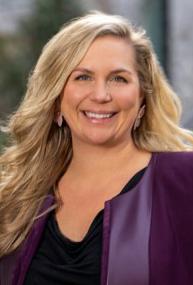

THANK YOU TO THOSE WCBA members who supported the inaugural year of the Wake County Bar Association Foundation Community Grants program! The WCBA Foundation has established a history of supporting programs in Wake County, specifically by fundraising for Legal Aid through the Bar Awards and supporting future Wake County lawyers through scholarships. This year the WCBA Foundation wanted to do more to foster programs in line with the WCBA Foundation’s mission of “serving our community by promoting justice.”
For this inaugural grant cycle, the WCBA Foundation selected Friends of Wake Guardian Ad Litem and the Wake County Legal Support Center
Friends of Wake Guardian ad Litem was established in 1991 with its mission to “change the lives of abused and neglected children by supporting the work of Guardians ad Litem.” The Friends of Wake GAL plans to use the Grant funds to support their educational advocacy project which helps these vulnerable children “get the extra education support they need” with a heavy emphasis on providing mentorship. To find out more about Friends of Wake GAL, please visit About — Friends of Wake (friendsofwakegal.org).
The Wake County Legal Support Center was started this year by our WCBA President and Tenth Judicial District President, Judge Ashleigh Parker
Lawyer on the Line: This year, the Public Service Committee is kicking off the Lawyer on the Line project, in partnership with Legal Aid of North Carolina. Attorney volunteers will participate in brief phone consultations to review and answer clients’ basic legal questions. No prior experience is required, and mentors from Legal Aid will be onsite to assist. Summer clerks are also invited to volunteer and will work under the supervision of a licensed attorney. Lawyer on the Line will take place on Tuesday, June 27 from 4:15 p.m. - 5:15 p.m. at the Legal Aid Central Intake Center. A social with WCBA volunteers and Legal Aid mentors will immediately follow.
Lunch with a Lawyer: Public Service Committee member Meghan Knight has worked tirelessly to expand that project this year. In coordination with the City of Raleigh’s Summer Youth Employment Program, volunteer attorneys will have the opportunity to meet and enjoy lunch with local high school students interested in learning more about the legal profession. Mark your calendars for Friday, July 28 at Campbell Law School. More details on this project to come.
With your help, we can continue increasing our impact on the lives of our Wake County friends and neighbors. Check your WCBA All-Member emails for more information on these projects and for links to sign up to volunteer. WBF
Dunston. The Center is designed to support self-represented litigants who need assistance. The idea is for the Center to be a community hub for people to get help with navigating the legal system. Through the Wake County Legal Support Center, self-represented litigants can obtain valuable assistance with the function of the work, referrals to lawyers in the community and access to forms to assist litigants. To find out more, please visit Wake County Legal Support Center (wakelsc.org).
Over the course of the last year, members of the WCBA Foundation Steering Committee, led by Maria Lynch, have encouraged WCBA members to help support these two great causes through the WCBA Foundation Grant program. We are proud to say that 100% of the WCBA Board, Officers and staff have donated to the WCBA Foundation Grant Program. Despite all of these efforts and your generous support, we are still short of this year’s goal of providing $25,000 to each of these wonderful programs. Fortunately, there is still time to give! 100% of your gifts will go directly to these two programs. If you would like to give, please visit WCBAF Community Grants (wakecountybar.org).
Finally, if you know of a community program that supports equal access to justice issues, please consider nominating the program for next year’s grant cycle. All organizations or programs must provide services within the geographic boundaries of Wake County. Thank you WCBA members for continuing to fight the good fight for Wake County residents by supporting the WCBA’s mission of promoting equal access to justice. WBF
Kimberly Miller is a partner at Owens & Miller PLLC. She is the vice chair of the WCBA Foundation.
PAGE 5 WAKE BAR FLYER • SECOND QUARTER 2023

PAGE 6 WAKE BAR FLYER • SECOND QUARTER 2023
DIRECT EXAMINATION: ANH LYJORDAN

DIRECT EXAMINATION IS THE FIRST opportunity for the jury to meet a witness. An effective lawyer will use the opportunity to personalize the witness, making the witness appear both likeable and credible. At the end of the day, the direct examination is a party’s best chance to tell his or her story. This is the story of Anh LyJordan, Director, Wake County Legal Support Center.
1.When you were in elementary school, what did you want to be when you grew up?
An astronaut – I was deeply inspired by Sally Ride and specifically the idea of women being able to do anything!
2.What was the most important lesson your parents taught you?
Too many lessons to narrow it down to one – but as refugees who came from Vietnam when Saigon fell in 1975, I think my biggest lesson is the power of the combination of perseverance with adaptation and flexibility. Working hard and keeping your head down is important but understanding that sometimes climbing over the mountain isn’t the only way to get across. You need to know and understand when to dig a tunnel, go around, hop in an air balloon, etc.
3.Who was your favorite teacher and why?
Mrs. Hill, my second grade teacher. She had that perfect elementary school teacher combination of kind and loving vibe. I’ll never forget that we were reading the book “Where the Red Fern Grows” in class – and I was just devastated at the end of the book and I wept and wept and wept in class. I got extra hugs that day and a feeling that she really cared about me.
4. Did you love or hate law school?

I loved law school. I worked in corporate America in labor relations at a Fortune 100 company for five years. Nabisco paid for me to go to law school to become a labor and employment attorney and I really appreciated the luxury of “being a student” as a full-time job
5. What was your most embarrassing courtroom experience?
In my first matter, I had an opposing counsel who took great satisfaction in making sure that everyone knew how little experience I had. He was smug, condescending, patronizing and a bully. It really shook my confidence and kept me from performing in the way that my hard work and preparation should have reflected. I learned that, as a new attorney, I needed to not only prepare myself substantively, but psychologically, in order to properly advocate for my clients.
6. What was your best courtroom experience?
I love working on a team so my favorite experience was a two-week trial with a team of six attorneys, led by the head of our office. I loved being holed up in a hotel eating, sleeping and drinking the case 24/7 with this team. I enjoyed the camaraderie that was built as we all busted our butts for 18 hours a day, the opportunity to learn from everyone’s preparation style and their courtroom style. Seeing the pay-off after months of hard work come to fruition in front of our clients and the judge, was an incredible professional and personal memory.
7. Why did you become a lawyer?
My undergraduate degree is in Industrial and Labor Relations. I spent five years negotiating contracts, working on employee relations issues and managing grievances and arbitrations. At some point, I got tired of doing all of the legwork just to have lawyers swoop in from corporate and make all the decisions. I thought “I can do that,” and applied to law school.
8. What has been the most surprising or unexpected development in your career?
My decision to leave my job as a trial attorney at the US Department of Labor after 10 years. I had loved the role so much – litigating on behalf of American workers – but I was tired of addressing problems after the damage had been inflicted. So many of the cases I handled took years before we could reach a resolution that resembled justice and I was left with “justice delayed is justice denied.” So I decided I wanted to work to prevent injustice from occurring in
PAGE 7 WAKE BAR FLYER • SECOND QUARTER 2023 CONTINUED ON NEXT PAGE
DIRECT EXAMINATION, CONTINUED

the first place. I feel so incredibly lucky that I am able to do exactly that in my work at the Wake County Legal Support Center, and more broadly, with the North Carolina Equal Access to Justice Commission.

9.What is your favorite book?
I have been an avid book reader my whole life so this question is torture. I’ll give you a few different books in different categories:
• Childhood: Where the Red Fern Grows, From the Mixed-Up Files of Mrs. Basil E. Frankweiler, Island of the Blue Dolphins
• Memoir: Sigh, Gone (the first book I ever read that mirrored my life experience and didn’t force me to analogize), My Beloved World
• Contemporary: The Life of Pi, anything by Erik Larson or Jon Krakauer, A Confederacy of Dunces, Love in the Time of Cholera
• Classic: The Awakening, The Grapes of Wrath,
10.What is your most marked characteristic?
I am a really enthusiastic teammate. Whether it is on a sports team, a trial team or trivia night team – I love being part of a group and finding ways to optimize everyone’s contributions to a group. I am flexible in that I am able to step into a leadership role if necessary, but I am equally happy to have a specific job assigned to me as a contributing member. There is no sweeter victory than one that you share with others!
11.What is your hidden talent?
I’m not sure I have any hidden talents. If I have a talent, I am pretty vocal about it!
12.Who are your real-life heroes?
My real life heroes are those are living their lives with integrity, people who walk the talk. My heroes are the ones who view the world as one community and understand the role and responsibility we can have to each other and then actually find a way to do something about it. I love the idea that we can all be every day heroes just finding a way to intentionally make the world a better place.
13.When and where were you happiest?
Honestly, I haven’t been happier than I have been recently. I am so fulfilled professionally, knowing that I am able to make a true impact with the work we are doing at the Legal Support Center. Personally, my two teenage sons will both be in high school next year and am savoring these moments we have left together as a family of six (four humans and two dogs) under one roof. And after growing up in Buffalo, I am loving the sunny blue skies of North Carolina that keep me feeling happy even in the wintertime! WBF
PAGE 8 WAKE BAR FLYER • SECOND QUARTER 2023
OVERCOMING PANDEMIC BRAIN FOG
BY CAMILLE STELL | LAWYERS MUTUAL CONSULTING & SERVICES

HAVE YOU EVER EXPERIENCED walking into a room and you can’t remember why you are there? Of course, all of us have experienced this phenomenon from time to time. But the feeling is different now, isn’t it? Rather than a momentary loss - “Why am I here? Oh yes, to find my keys!” – I experience a more constant fuzziness when I search for a specific word or attempt to define when something happened. According to Fast Company magazine, the pandemic really has made my memory worse. How our memory works
Art Markman, PhD, is a professor of Psychology and Marketing at the University of Texas at Austin and the author of “Bring Your Brain to Work.” According to Dr. Markman, there are three reasons why the pandemic has been bad for our memory. In a normal day, we encounter a lot of information. Our brain does not store all of it because forming memories is energetically expensive. Our brain starts the memory process by estimating whether a particular piece of information is worth holding onto. Even when we store this new information, our brain is trying to figure out how likely we’ll need that information in the future. Information we use often is easier to retrieve than information we only need in specific situations. And finally, memories are retrieved based on the similarity they have to the situation we are in right now. The pandemic has disrupted all three of these aspects of memory.
1.WAS THAT A SQUIRREL? WE ARE WORSE AT PAYING ATTENTION.
A common observation in memory research is that the more we can concentrate the more likely we are to remember. However, the pandemic has made it harder for us to concentrate. Many of us are feeling stress, burnout, anxiety or depression. These feelings make it harder to pay attention. Many people feel disconnected or at least less engaged from their work as a result of juggling so many extra responsibilities and burdens such as managing illness, at-home school or even navigating the journey back to normal.
Camille Stell is the President of Lawyers Mutual Consulting & Services and the co-author of the book “RESPECT – An Insight to Attorney Compensation Plans” published in December 2022. Continue this conversation by contacting Camille at camille@ lawyersmutualconsulting.com or 919.677.8900.
As I write this article, it takes longer for specific words to come to me – I had to leave a blank above, then fill in “navigating” later. When this happens, my brain feels like mush. I experience a sense of fog that is similar to taking cold medicine, I
can’t quite
get things into sharp focus
According to Dr. Markman, “The net result of this disengagement is that less information is triggering the work that is required to turn those encounters into longterm memories. Days may feel like a blur when looking back on them, because very few specific events may have been stored at all.”

2.WE ARE EXPERIENCING MORE SHORT-TERM ENCOUNTERS
During the pandemic we have had lots of short-term engagements such as multiple Zoom calls in a day or binge-watching a television series over the weekend. However, according to memory research, when we briefly engage, our brain decides that we don’t need to access that information later. As a result, you may have trouble remembering the plot of something you binge-watched when the new season drops.
Dr. Markman says if we want to remember some of the things we are doing more clearly, we should increase the time that we engage with them. Watching one episode of Ted Lasso per week rather than the entire series at once, will help us to better remember the details later.
3.EVERY DAY IS GROUNDHOG DAY
“Remembering information is easiest when there is some distinct factor that is associated only with that information,” says Dr. Markman. “That is why you may have many memories of a trip to a country you visited only once. When you see pictures from that trip or even think back on it, you may be able to call up lots of detail.” The pandemic has had the opposite effect because of our never-changing view.
Many legal professionals were able to work remotely, and we were in our home offices much more than we were ever in our work offices. With no events to attend, no court to prepare for, and day-after-day of Zoom meetings, the scenery didn’t change.
Now that we are back in the office, or working hybrid schedules and more events are opening around us, we should begin to shake that feeling that we are experiencing Groundhog Day.
STRATEGIES FOR REDUCING BRAIN FOG
Our brains function better when our stress and anxiety levels are lower. Taking care of our mental health is an important key to better brain function. If you need to see a professional, reach out to the NC State Bar LAP program, BarCares, or your health insurance company for guidance to find the professional help you need.
Other brain fog reducing strategies include:
·Making time to be outdoors
·Getting mental exercise such as doing puzzles,
·Getting physical exercise
·Practicing mindfulness playing games or learning a new language
·Getting plenty of sleep
Most health care professionals agree that reducing brain fog and getting back to normal is a matter of time. Pace yourself, treat yourself with kindness and the fog will begin to lift. WBF
PAGE 9 WAKE BAR FLYER • SECOND QUARTER 2023

OPEN POSITION AT THE NC STATE BAR: DEPUTY COUNSEL
Job Title: Deputy Counsel
Immediate Supervisors: Counsel
Department: Office of Counsel
Ultimate Supervisors: Counsel and Executive Director Positions Supervised: None
Purpose of the Job: The primary responsibilities of this position are to investigate and report to the Grievance Committee upon grievances filed against lawyers licensed to practice law in North Carolina, to represent the State Bar in state and federal trial and appellate proceedings, and to provide legal advice and other support to the State Bar and its committees, boards, and commissions.
Primary Job Responsibilities:
Work with the Grievance Committee
•Conduct investigations of grievances involving North Carolina licensees
•Prepare reports and make recommendations to the Grievance Committee concerning disposition of grievances
•Staff meetings of the Grievance Committee
•Field inquiries from grievance complainants and respondents
•Draft disciplinary orders issued by the Grievance Committee
•Provide legal advice and support to the Attorney Client Assistance Program
Trial and Appellate Work
•Try discipline, disability, and reinstatement cases before the Disciplinary Hearing Commission
•Represent the State Bar in discipline, disability, and injunctive proceedings in state and federal trial and appellate courts
•Represent the State Bar in trusteeship proceedings in state court and supervise and assist trustees of the practices of disabled, deceased, disbarred, and missing lawyers
•Represent the State Bar in state court proceedings to disburse funds from the trust accounts of disabled, deceased, disbarred, and missing lawyers
•Represent the State Bar in miscellaneous civil actions in state and federal trial and appellate courts and administrative tribunals
Work with other State Bar Committees, Boards, and Commissions
•Provide legal advice and support to State Bar committees, boards, and commissions
•Prepare agendas and minutes for assigned State Bar committees
•Staff meetings of assigned State Bar committees
•Draft proposed rule changes for assigned State Bar committees

Accountability and Authority: This position reports directly to the counsel and the executive director of the State Bar. Deputy counsel exercises independent judgment concerning his or her caseload and is expected to complete all assigned responsibilities timely with minimal supervision. Deputy counsel consults with the counsel and the executive director concerning issues of State Bar policy and concerning legal issues and proceedings respecting which deputy counsel represents the State Bar.
Required education, experience, and skills:
•JD degree and active North Carolina law license with no professional discipline
•Minimum of 5 years’ experience in the practice of law preferred, which may include in part judicial clerk experience
•Trial experience in state or federal courts or administrative tribunals preferred
•Excellent writing and speaking skills
•Academic success in undergraduate and law school
Working Conditions:
•Position is exempt in accordance with the Fair Labor Standards Act
•Hours: 9:00 a.m. to 5:00 p.m. Monday – Friday, one hour lunch break
•Overtime as required, unpaid
•Some travel, usually in state, mileage reimbursed
The North Carolina State Bar is an equal opportunity employer, and all qualified applicants will receive consideration for employment without regard to race, color, religion, sex, sexual orientation, gender identity or expression, pregnancy, age, national origin, disability status, genetic information, protected veteran status or any other characteristic protected by law.
This job description is not an employment agreement or contract. Management has the exclusive right to alter this job description at any time without notice. Please send resumé, cover letter, references and a recent writing sample to kjean@ncbar.gov.
PAGE 11 WAKE BAR FLYER • SECOND QUARTER 2023
TENTH JUDICIAL DISTRICT SPRING SWEARING-IN

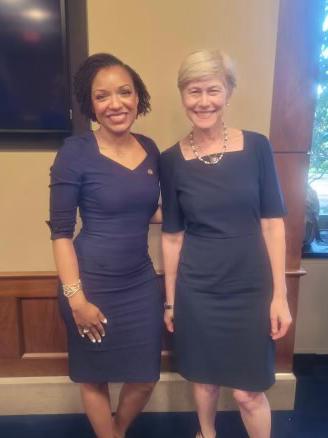
On May 11, Judge Paul Ridgeway administered the oath to 15 new attorneys, welcoming them to the Tenth Judicial District at this year’s Spring Swearing-In.
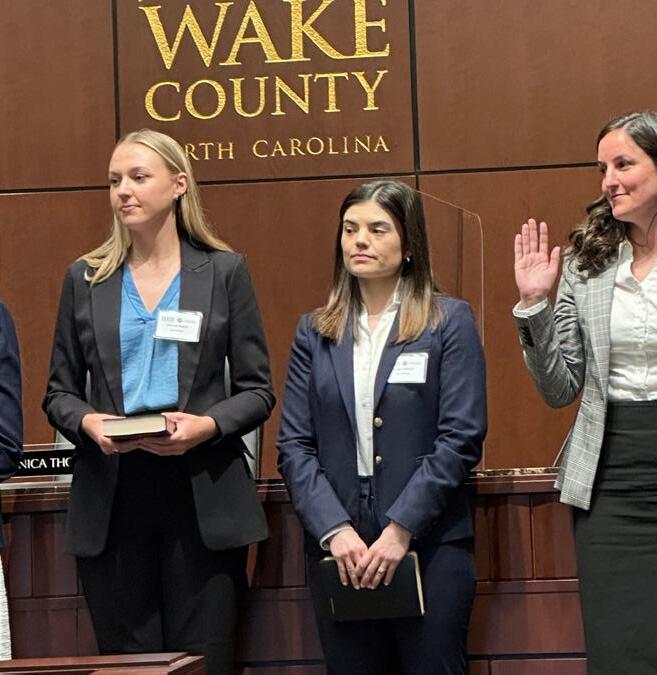
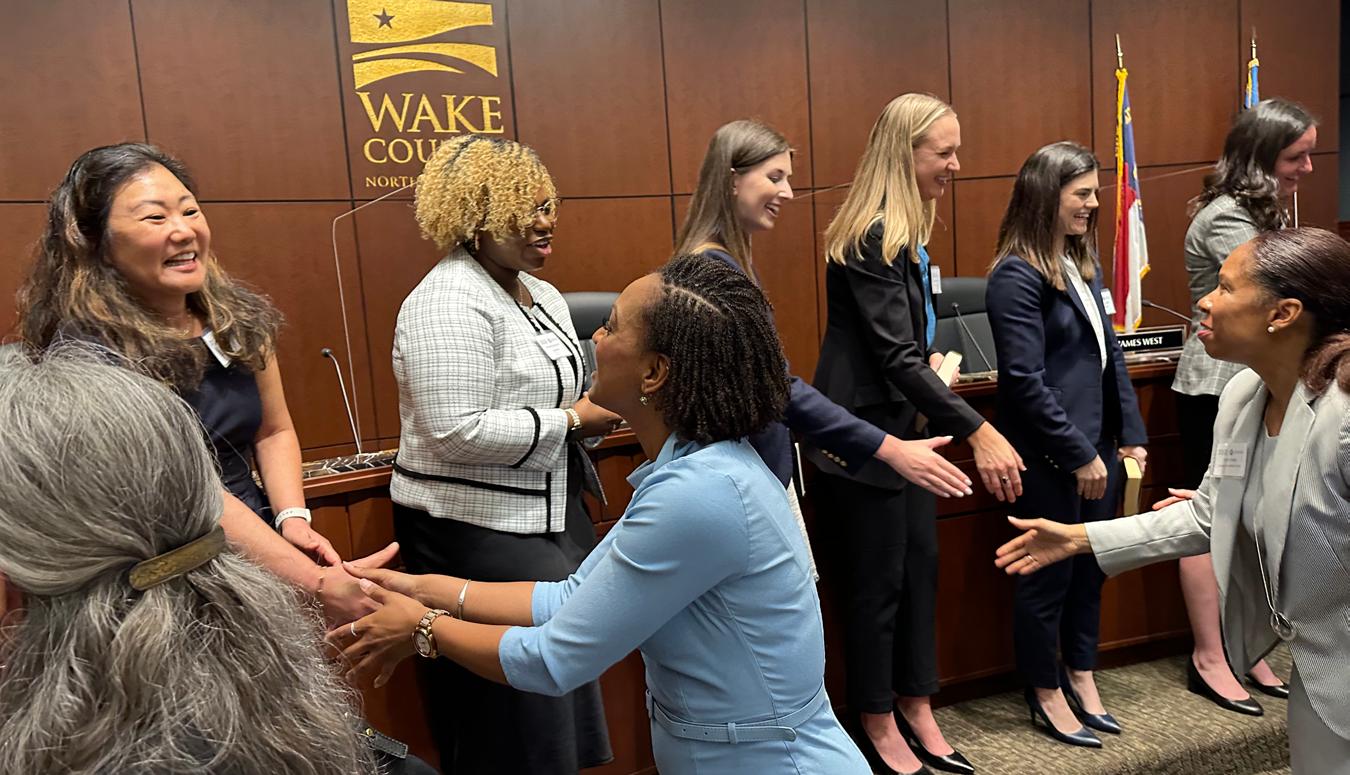
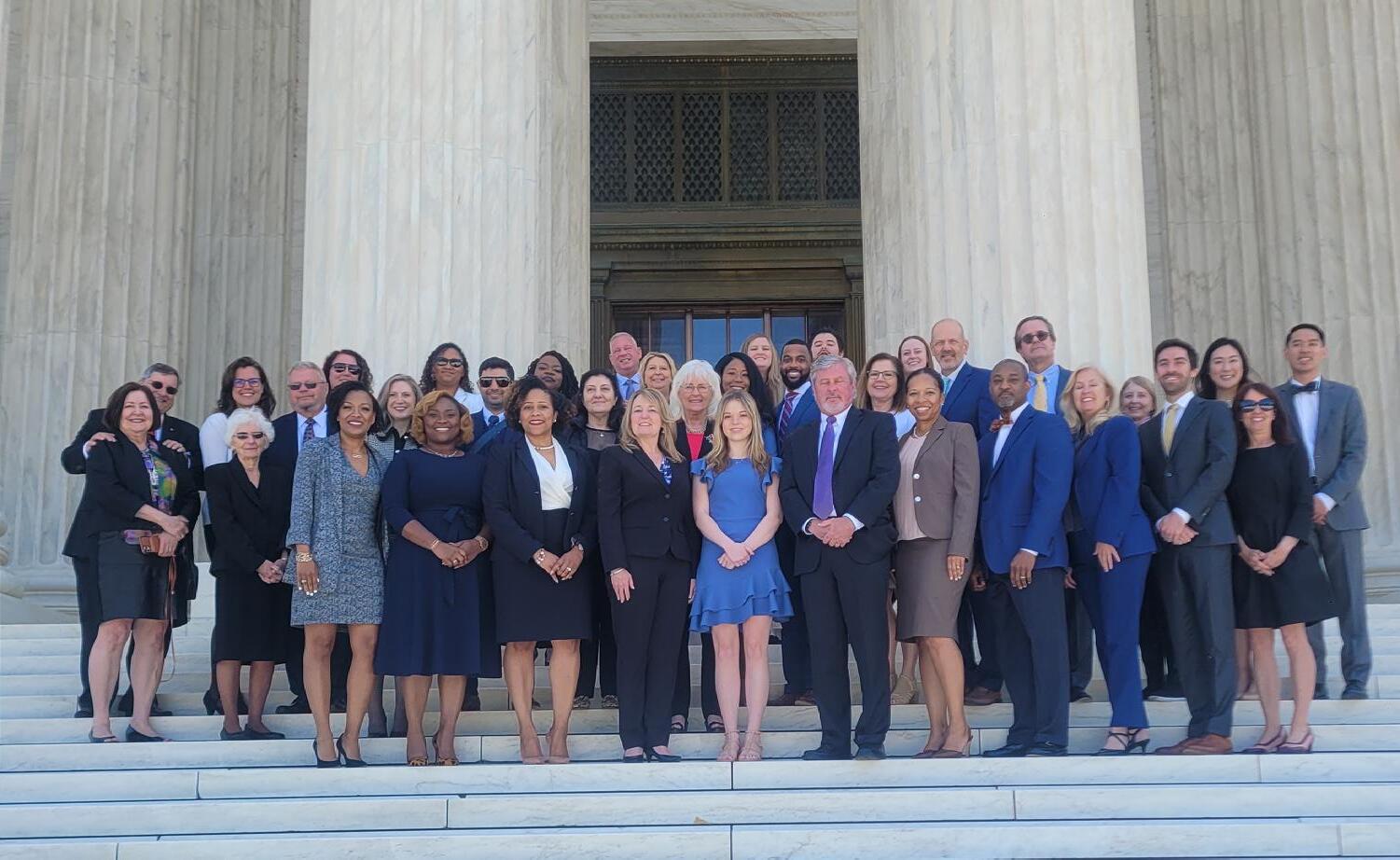
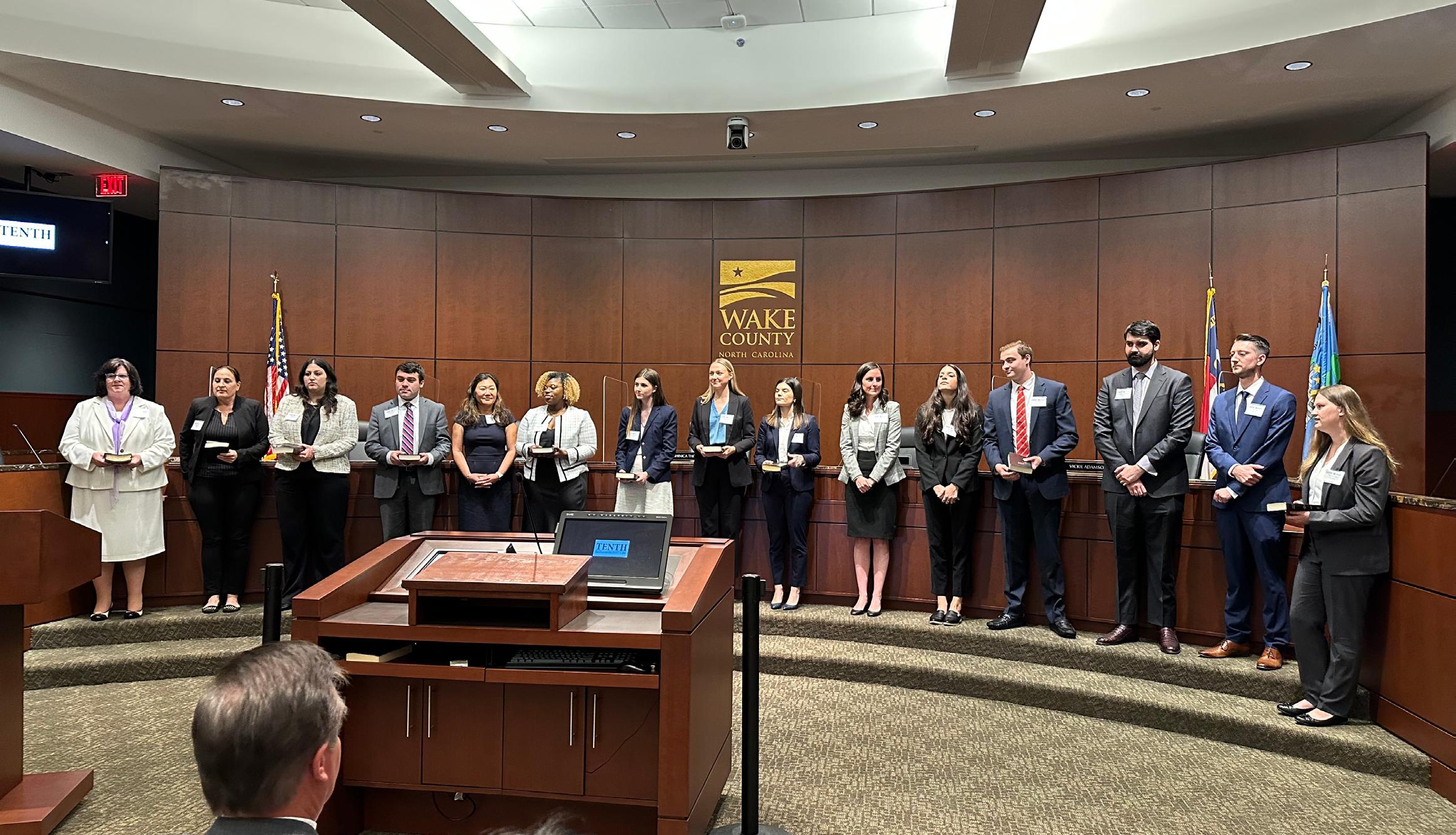
US SUPREME COURT BAR SWEARING-IN
PAGE 12 WAKE BAR FLYER • SECOND QUARTER 2023
Judge Ashleigh Parker Dunston, WCBA & Tenth Judicial District Bar President and Swearing-In Committee
Chair Jennifer Jones joined 27 new inductees from the WCBA as they were sworn into the US Supreme Court on May 18 in Washington, D.C. They enjoyed a reception with US Representative Deborah Ross (NC-02).
WELCOME NEW MEMBERS
WE WELCOME THE NEWEST MEMBERS TO THE WAKE COUNTY BAR ASSOCIATION
Anne Caroline Austin | Law Offices of Tiffany A Lesnik
Natasha Barone | Jordan Price Wall Gray Jones & Carlton PLLC
Michael Boyd | Legal Aid of NC
Carrick Charles Brooke-Davidson | Williams Mullen
William Bucha | UNC Chapel Hill
Alejandro BuenRostro | BuenRostro Law Firm
Andrew Covington | Covington Law, PLLC
J.Brett Davis | Law Offices of James Scott Farrin
James Columcille Dever | US District Court –Eastern District of NC
Carolyn Elizabeth Duhon | Hedrick
Gardner Kincheloe & Garofalo LLP

Matthew Flinchbaugh
S.Byron Frazelle
Megan Garcia-Davis | Legal Aid of North Carolina, Inc.
John C. Garrett | The Roper Law Frim
Aaron Blaine Gavin | Hannah Sheridan & Cochran LLP
Sarah Hope Gerow
Scheree Gilchrist | Legal Aid of NC
Sharante Gore | Smith Dominguez PLLC
Brianne Habit
Allison Joelle Harvill | Envisage Law
Maeve Healy | Campbell University School of Law
Madeline Eilish Hill
Devon Horine | Bailey & Dixon, LLP
Sarah Izzell-Cutler | Tharrington Smith LLP
Aaron V. Jacobson | Legal Aid of NC
Barry C. Jennings | Jennings Law
Zachary Layne | Hannah Sheridan & Cochran LLP
Kathryn Nicole Levonick | Legal Aid of NC
Howard Lintz | Legal Aid of NC
Jonathan R. Marx
Richard Hunter Morris | Brady Cobin Law Group PLLC
Caitlin Machell Pevey
Jonathan Pevey | Winston and Strawn LLP
Dahlia Radcliffe-Castillo
Milissa Ralph | Ogletree Deakins Nash Smoak & Stewart PC
Jennifer Jeanne Robinson
Michael James Rosenthal | NC Department of Commerce
Travis Rothschild | Legal Aid of NC
Caitlin Ann Ryland | Legal Aid of NC - Farmworkers Unit
Michael Lee Sanders | Legal Aid of NC
Lexus Tiel Sanders Njie | Legal Aid of NC
Jada Saxon | Wake County Public Defenders Office
Joel David Schlieman
Melissa Jo Smith | Merritt Webb Wilson & Caruso PLLC
Christopher Albert Stella
Jennifer Stuart | Legal Aid of NC
Vilma David Suarez
Deonte’ LeVar Thomas | Wake County Public Defenders Office
Marissa Thomas | Legal Aid of NC
Allison Weller Tikare | Legal Aid of NC
Casey Evans Wentz | Barringer Sasser LLP
Dorothy T. Whiteside | Office of Indigent Defense Services
Tonya J. Williams | Legal Aid of NC
PAGE 13 WAKE BAR FLYER • SECOND QUARTER 2023
SUICIDE AND THE LEGAL PROFESSION
ED ERGENZINGER, J.D., PH.D.
This article was first published on NCBarBlog’s Intellectual Property Law Section page on October 7, 2022, and has been reprinted with the consent of the North Carolina Bar Association.

Earlier this year, a survey of lawyers and staffers hailing mostly from big law firms revealed that 19% of respondents contemplated suicide at some point in their professional careers. These results, coupled with the shocking death by suicide of attorney and former Miss USA Cheslie Kryst, contributed to a growing groundswell of attention and interest in mental health issues within the legal profession.
Suicide is the 12th leading cause of death in the U.S., yet it’s still a topic that many people are uncomfortable talking about. The stigma surrounding mental health and suicide can make it difficult for those who are struggling to reach out for help. And even when someone does seek help, there’s often not enough available.
We need to do better at breaking the silence around suicide and mental health. By starting the conversation, we can eliminate the stigma and help those who are struggling get the support they need.
UNDERSTANDING SUICIDE
I spent six years there. I worked very hard to move up the rungs, and I got to the point where I had a green light for partnership. Then I became so severely depressed that I was unable to work. I had to take a leave for several months under the Family and Medical Leave Act.
I remember checking multiple times to see if the generous life insurance policy that the big law firm had taken out on each of its associates would pay out in the event of suicide. I didn’t have a plan yet, but it was on my mind.
THOUGHTS VS. ACTIONS
Twelve years after I was fired from that firm (on the morning I returned from FMLA leave), I was caught in another deep depression that was stubbornly resistant to the various drug regimens I had been prescribed.
And I thought about suicide. A lot. Thoughts that I didn’t want to go on living. That I just wanted to escape the despair and intense anxiety that accompanied my depression. My brain felt utterly overwhelmed by every neural impulse, whether generated by the external world or memories sparked from within. The idea of being able to turn that off had some appeal.
“Do you have thoughts of suicide?”
The words hung in the air as I sat hunched over in the examination room of the emergency mental health facility.
According to the Centers for Disease Control, in 2020, there were
45,979 deaths by suicide in the U.S. That’s about one death every 11 minutes. There were also 1.2 million Americans who attempted suicide, 3.2 million who planned a suicide attempt, and 12.2 million who seriously thought about suicide.
Suicide victims and those who contemplate suicide don’t necessarily want to die. They want relief from intense emotional or physical pain, or to bring an end to an extremely stressful situation when they feel there is no other solution. As author David Foster Wallace, who died by suicide after suffering from depression for years, wrote in the best-selling book “Infinite Jest”:
The so-called ‘psychotically depressed’ person who tries to kill herself doesn’t do so out of ‘hopelessness’ or any abstract conviction that life’s assets and debits do not square. And surely not because death seems suddenly appealing. The person in whom its invisible agony reaches a certain unendurable level will kill herself the same way a trapped person will eventually jump from the window of a burning high-rise . . . It’s not desiring the fall; it’s terror of the flames. And yet nobody down on the sidewalk . . . can understand the jump. Not really. You’d have to have personally been trapped and felt flames to really understand a terror way beyond falling. I know. The first time I wrestled with suicidal thoughts was an associate at Biglaw. Where the price of the big bucks and fancy perks was all of your time, accounted for in six-minute increments.
Over the years, my psychiatrists and counselors had all made a distinction between thinking about suicide in general terms and having a particularized desire to kill yourself.
“Yes, but no plans,” I said.
“No preparations or plans for how you’d do it?”
“No, nothing like that.”
“More like, ‘Wouldn’t it just be easier if I weren’t here?’”
“Yes,” I nodded. I’d been truthful but I couldn’t help feeling like I was hiding something. No, I didn’t have a plan, but thoughts about suicide had been consistent and frequent. I wasn’t going to jump in front of a bus, but if I suddenly found myself in the path of one, I wasn’t sure I would get out of the way. That couldn’t be good.
But I didn’t volunteer this information and I wasn’t asked. I trusted that there was a reason why the trigger for emergent concern was set at “having a plan” and answered accordingly.

SUICIDAL NEUROSCIENCE
The reason the trigger for emergent concern is set between thought and action is because there’s a difference between someone who is actively planning their suicide and someone who just thinks it would be easier if it were all over. And it turns out that researchers are zeroing in on the neural circuitry underlying this difference.
PAGE 14 WAKE BAR FLYER • SECOND QUARTER 2023
CONTINUED ON NEXT PAGE
SUICIDE AND THE LEGAL PROFESSION, CONTINUED
The brain areas that seem to be primarily involved in suicidal thoughts and behaviors are, not surprisingly, part of systems related to emotion and impulse regulation. One of these areas is behind and above the bridge of your nose (on both sides — the brain is bilateral) and is known as the ventral prefrontal cortex (VPFC). Impairments in the middle and side regions of the VPFC and their connections appear to play a role in the excessive negative and blunted positive internal states that can stimulate suicidal ideation. Above the VPFC is the dorsal prefrontal cortex (DPFC), where impairments in it and its connections with the inferior frontal gyrus have been associated with suicide attempt behaviors. And both the VPFC and the DPFC are connected to portions of the dorsal anterior cingulate cortex (dACC) and insula, which may mediate the transition from suicidal thoughts to behaviors by switching between the VPFC and DPFC systems.
Nearly all mental health conditions are associated with an increased risk of suicide mortality, but the risk is highest among those with bipolar disorder, depressive disorders and schizophrenia spectrum disorder. These disorders, in particular, have also been associated with alterations in the VPFC, DPFC, dACC and insula.
The hope is that the neurocircuitry can be understood well enough that more effective and targeted interventions and preventive measures can be developed. At the very least, it’s apparent that there is something more going on with suicidal thoughts and behaviors than weakness, cowardice or any number of other moral failings or character flaws frequently (and mistakenly) attributed to those who die by their own hand.
WARNING SIGNS
The problem of suicide and suicidal thoughts in the legal profession is apparent early on. A 2021 survey of law student well-being revealed that 11% of law students had thought seriously about suicide in the previous year. That’s almost double the number reported in a 2014 survey.
Identifying the warning signs and taking them seriously constitute the most effective prevention strategy for suicide. Once warning signs are identified, individuals can receive professional help. Warning signs of suicide (in addition to someone threatening or talking about wanting to hurt or kill themselves) include:
•Feeling unusually anxious, agitated, hopeless or trapped.
•Feeling uncontrolled anger or seeking revenge.
•Acting reckless or engaging in risky activities.
•Increasing use of drugs or alcohol.
•Being unable to sleep or sleeping too much.
•Experiencing dramatic mood changes.
•Withdrawing from friends, family, and society.
•Seeing no reason to live or having no sense of purpose in life.
•Seeking access to firearms, available pills or other means for killing oneself.
If you think a colleague is at risk for suicide, encourage them to seek help through the North Carolina Lawyers Assistance Program (NCLAP). NCLAP is here to support lawyers, judges, students and other legal professionals who are at risk for suicide or who know someone at risk.
And if you think a colleague is an imminent danger to themselves, contact the 988 Suicide and Crisis Lifeline. The 988 Suicide and Crisis Lifeline provides the following recommendations if someone is threatening suicide:
• Be direct. Talk matter-of-factly and openly about suicide.
• Be willing to listen. Allow expressions of feelings and accept the feelings.
• Be non-judgmental. Don’t lecture on the morality of suicide, the validity of their feelings or the sanctity of life.

• Get involved. Make yourself available to show interest and support.
• Don’t act shocked. It will put distance between you and them.
• Don’t be sworn to secrecy. Seek help and support.
• Offer real hope. Point out help and resources that are available, not just glib reassurance.
• Take action. Remove access to any means for killing oneself, such as guns or stockpiled pills.
• Get help. Contact persons or agencies specializing in crisis intervention and suicide prevention.
It’s taken me many years to get to the right diagnosis and the right combination of medicine and therapy to manage my bipolar disorder. Still, at every therapy session or med-check appointment, I’m asked if I have any thoughts or plans of suicide. And, at least for now, my answer is: “No.” WBF
If you or someone you care about is contemplating suicide, seek help immediately. For help 24/7, call or text 988 to contact the 988 Suicide and Crisis Lifeline. The Lifeline provides confidential support to anyone in suicidal crisis or emotional distress. Support is also available via live chat. Help is also available through BarCares and NCLAP.
Ed Ergenzinger, JD, PhD is a patent attorney, neuroscientist, adjunct professor, freelance writer and mental health advocate living with bipolar disorder. For the WCBA, he is on the Lawyer Support Subcommittee of the Membership Committee. He’s a contributor at Psychology Today, Business Insider, the National Alliance for Mental Illness and The Good Men Project.
PAGE 15 WAKE BAR FLYER • SECOND QUARTER 2023






 JOHN WARD, NICHOLLS & CRAMPTON
JOHN WARD, NICHOLLS & CRAMPTON



























